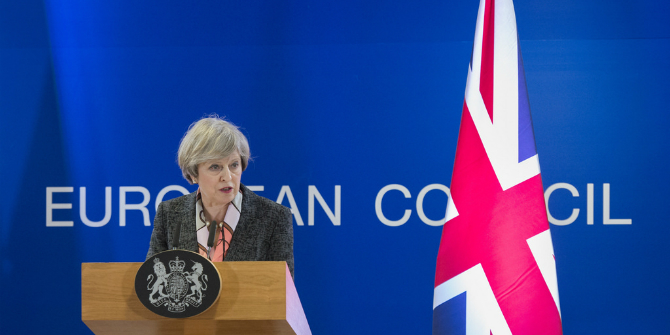 On Wednesday, Article 50 will be triggered by the UK. On the same day of this announcement, the European Parliament Research Service published for the first time a document that reflects some of the thinking of inside the EU. Barbara Aubin, explains why the UK will enter the negotiations in a weak bargaining position and shows that Theresa May’s pledge for a clean and quick Brexit is ultimately an illusion.
On Wednesday, Article 50 will be triggered by the UK. On the same day of this announcement, the European Parliament Research Service published for the first time a document that reflects some of the thinking of inside the EU. Barbara Aubin, explains why the UK will enter the negotiations in a weak bargaining position and shows that Theresa May’s pledge for a clean and quick Brexit is ultimately an illusion.
The stark contrast in language
UK Prime Minister Theresa May has kept a very confident and ambitious tone. From her first speech to the Conservative Party conference on 5th October 2016 where she clearly advocated for a hard Brexit and criticised “international elites” and “citizens of nowhere”; to the speech at Lancaster House on 17th January 2017 where she outlined her Brexit plan including a “bold and ambitious free trade agreement”.
On the EU side however, the language is much more negative. Key policy-makers in Brussels are rather pessimistic about the assumptions of the UK Government regarding the negotiations and its complexity. In the European Parliament’s in-depth analysis of the Brexit negotiations, the wording is pretty tough and includes statements like: “If Britain wants a half-decent deal, it needs the goodwill of its partners. That means ministers should be polite, sober and courteous” and “London does not realise how weak its cards are”. Indeed, the report shows that Brussels is closely monitoring British politics and even use specific quotes to show the condescension of some officials such as David Davies and Boris Johnson. These attitudes have created resentment in some Members States and will likely be in their disfavour in the negotiations room when trying to get concessions.
A united EU front
An additional element that will undermine the UK position in the negotiations is the united front EU Members States and institutions have kept so far. Some are insinuating that this will change when the talks get into greater details. However, the EU has been consistent in their “no notification – no negotiation” stance as well as on the ‘indivisibility’ of the four freedoms.
Now, with the negotiations about to start the new front that seems to emerge is the requirement to find an agreement on the ‘divorce bill’ before allowing progress on the Article 50 separation talks. Again, the two sides are in opposition on this topic. On the one hand, EU institutions claim that the UK as a £60 Billion pounds liability and other hand, Brexit Minister David Jones told MPs that the UK can legally walk away from the EU without paying a divorce bill. With these circumstances, Theresa May’s pledge to negotiate the divorce and the future relations within the two years period seems even more delusional.
Photo by Number 10 on Flickr. Used under Creative Commons (CC BY-NC-ND 2.0) license.
The UK Government’s illusion
In here speech on ‘A Global Britain’, Theresa May has promised that the UK would have secured an orderly separation from the EU and the new terms of the relationship within the two years period. However, there are many reasons why this is unrealistic and completely ignores the complexity of the process and EU decision-making. It is worth reminding that over a period of nine months since the results of the EU referendum, the UK has only been able to replace their leader and pass the Bill that will allow the Government to officially announce their departure. This is a huge amount of time just for dealing with domestic politics.
While the clock will be ticking from next Wednesday when the UK triggers Article 50, Donald Tusk has just scheduled the next European Council meeting to adopt the guidelines of the Brexit talks, one month after. Then, with two major elections in Europe, the focus will not be on the Brexit negotiations for a while. The French elections are first to come and at the ‘Grand Debate’ on 20th March, Brexit was barely, or not mentioned at all by the candidates to the Presidency. The German elections are pushing even further the negotiations with the EU unlikely to turn its full attention to the future trading relationship until after September 2017.
Adding to this, Michel Barnier statement about planning to end the negotiations in October 2018 to allow time for the European Parliament to ratify the deal. But also, another promise from the UK Government to submit the Brexit package to Westminster before the European Parliament. All this, brings the total negotiation-time to less than a year.
With negotiation-time decreasing rapidly, what’s the Prime Minister’s plan B?
So what’s the plan B, Prime Minister? Just recently Politico has written about British officials from the U.K.’s Department for International Trade investigating a “10-year interim deal to smooth the UK’s exit from the EU”. This would allow more time for a full trade deal to be negotiated while avoiding a “cliff edge” scenario for each side’s economy.
While this is a welcome move, for this to work, it would need to include a similar migration zero-barriers deal for another ten years, and this might be difficult to swallow for the 52% Brexiters at home.
A version of this article appeared on Blogactiv, it gives the views of the author, and not the position of LSE Brexit, nor of the London School of Economics and Political Science. Photo by Number 10 on Flickr. Used under Creative Commons (CC BY-NC-ND 2.0) license.
Barbara Aubin is the Head of Content at the 1989 Generation Initiative based at the LSE.








BREXIT: Where’s Theresa May’s Plan B?
10th September 2016
https://goodstrat.com/2016/09/10/brexit-wheres-theresa-mays-plan-b/